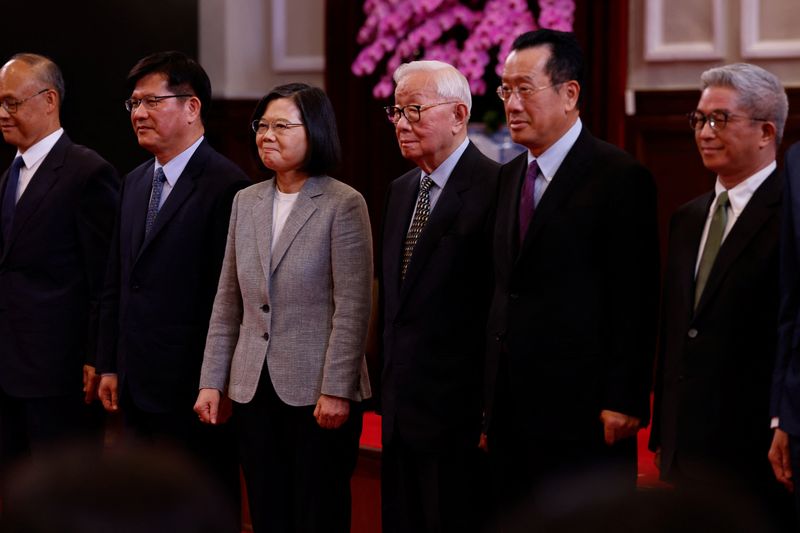Taiwan, facing Chinese pressure, to stress importance of peace at APEC summit
2023.11.09 23:03
4/4

© Reuters. Taiwan’s President Tsai Ing-wen poses for a photo with Taiwan’s APEC representative and TSMC founder Morris Chang at a press conference in Taipei, Taiwan November 10, 2023. REUTERS/Ann Wang
2/4
By Sarah Wu
TAIPEI (Reuters) – Taiwan will stress the importance of peace in the region at next week’s APEC summit, President Tsai Ing-wen said on Friday, one of the few international bodies both Taiwan and China are members of and where their officials meet.
The 21-member Asia-Pacific Economic Cooperation (APEC) forum will meet in San Francisco for the 30th APEC summit, the first hosted by the United States since 2011.
Chinese-claimed and democratically ruled Taiwan, which takes part in APEC as “Chinese Taipei” and does not send its president to summits, has faced increased military pressure from Beijing including two rounds of major war games over the past year and a half.
Tsai told reporters at the presidential office that the first message she wanted her representative to APEC, chip giant TSMC founder Morris Chang, to send at the summit was that Taiwan was dedicated to promoting regional peace and prosperity.
“At a time when the world is facing various challenges, we must work together to reduce conflicts in the region and jointly create a peaceful and stable environment for regional economic development,” she said.
“Taiwan is a reliable, safe, and trustworthy partner in the international community,” Tsai added.
Chang, speaking after Tsai, said he believed no APEC member would oppose peace, prosperity and development.
Neither the president nor Chang, representing Tsai for the sixth time at an APEC summit, took questions.
APEC has traditionally been one the few forums where China and Taiwan talk, even if just in passing for pleasantries.
China has not formally confirmed President Xi Jinping’s attendance at this year’s summit.
Chang, 92, had a brief chat with Xi at last year’s APEC summit in Bangkok, a rare high-level interaction.
China cut off a formal talks mechanism with Taiwan after Tsai first won office in 2016, believing her to be a separatist. Tsai says only Taiwan’s people can decide the island’s future and strongly rejects China’s sovereignty claims.
While Chang is now retired from TSMC, he remains influential as the elder statesman of Taiwan’s chip industry.








